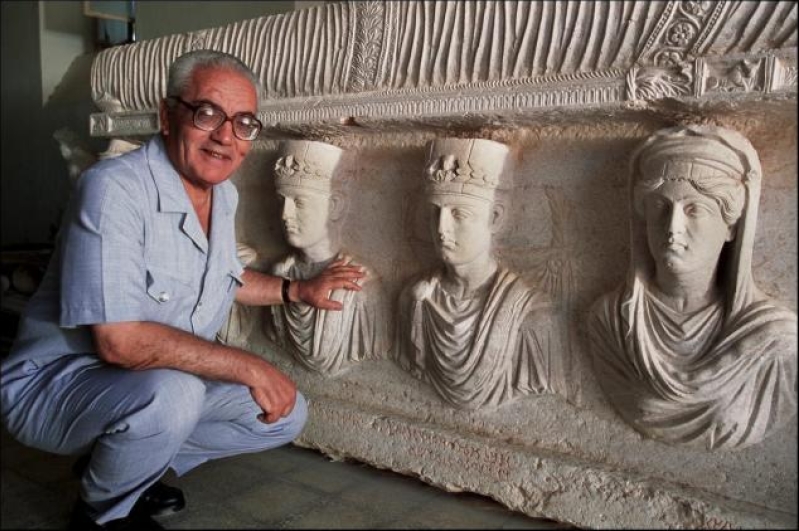
Islamic State militants brutally tortured and beheaded an 82-year-old retired archaeologist in Palmyra, Syria because he refused to reveal the location of the ancient city's gold and silver treasures.
The family of Khaled Asaad are said to have been told that the retired scholar, who worked for more than 50 years as head of antiquities in Palmyra, was beheaded yesterday after undergoing weeks of severe torture from the Islamic extremist groups, the BBC reports.
Following the horrific killing, which took place in the city's center, the militants shared images on social media showing the mutilated remains of Mr. Asaad chained to a railing, with his severed head - still wearing glasses - placed on the floor between his feet.
A sign attached to the lifeless body claimed he had been in contact with regime officials and accused him of being an apostate and a regime loyalist for representing Syria in conferences abroad with "infidels", as well as being director of Palmyra's "idols".
In May, ISIS fighters overtook the ancient city, which is a UNESCO World Heritage site famed for well-preserved Greco-Roman ruins. At the time, the jihadist group beat back Syrian forces under control of the Assad regime, which retreated and left the ruins and the main tourist hotel unguarded.
Prior to ISIS' invasion, hundreds of ancient statues were moved from the city to other safe locations: "Hundreds and hundreds of statues we were worried would be smashed and sold are all now in safe places," Maamoun Abdulkarim, the head of the Antiquities and Museums Department in Damascus, said at the time. "This is the entire world's battle."
Antiquities officials said they believed IS militants had interrogated Mr. Asaad, who was an "expert" on Palmyra's history and even spoke the ancient language, attempting to get him to reveal where authorities had hidden the "stores of gold" secreted out of the city.
"I deny wholeheartedly that these stores exist," Mr. Abdulkarim said, revealing that Mr. Assaad had been detained by ISIS last month along with his son Walid, the current antiquities director for Palmyra, who was later released.
"The whole family is truly remarkable. [Mr Assaad's] other son Mohammed and his son-in-law Khalil actively participated in the rescue of 400 antiquities as the town was being taken over by the jihadis," he said.
Mr. Abdulkarim also told reporters that he had urged Mr. Asaad to leave Palmyra along with the artifacts in May, but he had refused.
"He told us 'I am from Palmyra and I will stay here even if they kill me," he said.
Speaking to the AP, Khalil Hariri, Mr. Asaad's son-in-law who works at Palmyra's archaeological department, expressed shock at the senseless killing: "Asaad was a treasure for Syria and the world," he said. "Why did they kill him?"
Speaking in Washington, State Department spokesman John Kirby said, "The United States condemns in the strongest possible terms this murder ... of a man who dedicated his life to preserving Syria's cultural treasures."
"Like so many of ISIL's victims, his life and extraordinary work stand in stark contrast to that of his barbaric killers. These attempts to erase Syria's rich history will ultimately fail," Kirby said, using an alternate acronym for IS.






